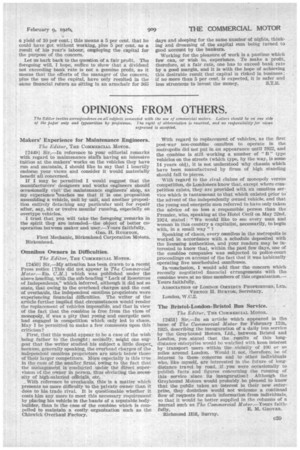OPINIONS FROM OTHERS.
Page 55

If you've noticed an error in this article please click here to report it so we can fix it.
The Editor invites corresPondence On all subjeets costnected with the use of commercial ntotors. Letters should be on one side of the Paper only find typewritten by preferoae. The right of abbreviation is reserved, and no responsibility for views
expressed is accepted,
Makers' Experience for Maintenance Engineers.
The Editor, THE COMMERCIAL MOIOR.
[24491 reference to your editorial remarks with regard to maintenance staffs having an intensive tuition at the makers' works on the vehicles they have run and maintain, I should like to say that I heartily endorse your views and consider it would materially benefit all concerned.
If I may be permitted I would suggest that the manufacturers' designers and works engineers should occasionally visit the maintenance engineers shop, as my experience 'teaches me that it is one proposition assembling a vehicle, unit by unit, and another proposition entirely detaching any particular unit for repair after, say, six or twelve months' running, especially on overtype vehicles.
I trust that you will take the foregoing remarks in the spirit they are intended—the object of better cooperation between maker and user—Yours faithfully, GEO. H. Ilusasosf, Fleet Mechanic, Birkenhead Corporation Motors.
Birkenhead.
Omnibus Owners in Difficulties.
The Editor, THE COMMERCIAL MOTOR.
[24501 Sir,—My attention has been drawn to a recent Press notice This did not appear in The Commercial Motor.—En. Cit.] which was published under the above heading, with the sub-heading "Lack of Resources of Independents," which inferred, although it did, not so state, that owing to the overhead charges and the cost of overhauls, the independent omnibus proprietors were experiencing financial difficulties. The writer of the article further implied that circumstances would render the replacement of vehicles impossible, and that in view of the fact that the combine is free from the vices of monopoly, if was a pity that young and energetic men had engaged in competition which only led to chaos. May I be permitted to make a few comments upon this criticism? • . First, that this would appear to be a case of the wish being father to the thought ; secondly, might one suggest that the writer studied his subject a little deeper., because, generally speaking, the overhead charges of the independent omnibus proprietors are Much below those of their larger competitors. More especially is this true in the case of the smaller firms, owing to the fact that the management is 'conducted under the direct supervision of the owner in person, thus obviating the necessity of high-salaried offiCiaTS, etc.
With reference to overhauls, this is a matter which presents no more difficulty to the private owner than it does to his trade rival. It is questionable whether it costs him any more to meet this necessary requirement by placing his vehicle in the hands of a reputable bodybuilder, than is the case of the combine which is compelled to maintain a costly organization such as the Chiswick Overhaul Factory. With regard to replacement of vehicles, as the first post-war non-combine omnibus to operate in the metropolis did not put in an appearance until 1922, and the combine is still working a number of " B " type vehicles on the streets (which type, by the way, is some 14 years old), it is not understood why chassis which have been manufactured by firms of high standing should fall to pieces.
With regard to the rival claims of monopoly versus competition, do Londoners know that, except where competition exists, they are provided with an omnibus service which is tantamount to that which existed prior to the advent of the independently owned vehicle, and that the young and energetic men referred to have only taken the advice of no less a responsible person than the Premier, who, speaking at the Hotel Cecil on May 22nd, 1924, stated : "We would like to see every man and woman in this country a capitalist, necessarily, to begin with, in a small way " ?
Speaking of chaos, every omnibus in the metropolis is worked in accordance with a schedule deposited with the licensing authorities, and your readers may be interested to know that, within the past few days, one of the combine companies was subjected to police-court proceedings on account of the fact that it was habitually operating five unscheduled omnibuses.
In "conclusion, I would add that the concern which recently negotiated financial arrangements with the combine were at no time members of this organization.— Yours faithfully,
ASSOCIATION OF LONDON OMNIBUS PROPRIETORS, LTD. VERNON H. BuitToN, Secretary.
London, W.C.2.
The Bristol-London-Bristol Bus Service.
The Editor, THE COMMHRC1AL Mown.
(2451] Sir,—In an article which appeared in the issue of The Commercial Motor for February 17th, 1925, describing the inauguration of a daily bus service by the Greyhound Motors, Ltd., between Bristol and London, you stated that the results of this longdistance enterprise would be watched with keen interest by transport users within the. vicinity of 100 or so miles around London. Would it not, therefore, be of interest to these concerns and to other individuals who, like myself, are interested in the future of longdistance travel by road, if you were occasionally to publish facts and figures concerning the running of this service 'since its inauguration? Although the Greyhound Motors would probably be pleased to know that the public takes an interest in their new enterprise, they doubtless would not welcome a continual flow of requests for such information from individuals, so that it would be better supplied in the columns of a Journal such as The Commercial Motor.—Yours faith Richmond Bill, Surrey. E. M. GROVER.


























































